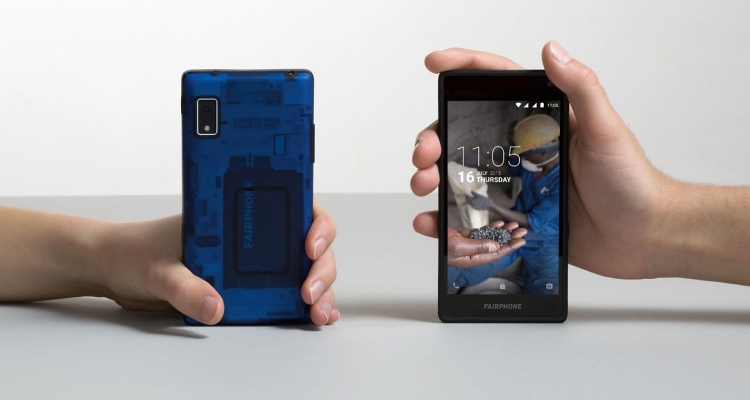Have you ever thought of what all the components of your phone went through before they turned into your phone? And then what was the journey of your phone before it arrived into your hands?
Fairphone came with an answer. To all of its customers it offers the possibility to know more about the story of their phone. When they entered the market, they came with a completely insane idea – to solve the electronics supply chain transparency.
In 2013 they started selling their phones as a company that had never made a phone before. Their customers had never seen a single one of their phones before. In 2015 they released their second Fairphone model. Altogether they managed to sell 60000 phones of the first model and now they plan to sell more than twice as much of the second model.
Complicated supply chain
The phone isn’t 100 per cent fair, however Fairphone makes progress every day and keeps informing its customers regularly through their frequent blog posts. The electronics industry is known for the overly complicated nontransparent supply chains with set processes that are difficult to change. The popular industry leaders such as Apple or Samsung are very much aware of the challenges of rising demands on environmentally friendly products made in safe working conditions but the changes come only too slowly.
Conflict minerals
“Building a phone to create a fairer economy.”
The mining and trade with metals and minerals used for the electronics production are known to be often connected with financing of local armed groups in certain regions or countries such as the Democratic Republic of Congo (DRC). In effect, a lot of companies have to face increased regulation (e.g. the Dodd-Frank Act) in terms of the origin of raw materials and the production process transparency.
Instead of transparent reporting, many companies have a quick solution in the form of a relocation of their production factories or a change of their suppliers. Fairphone goes the other way. It sources the materials such as tin, tungsten, tantalum and gold right in the high risk zones and its production also stays in the regions known for cheap labour and catastrophic working conditions.
Fairphone changes the operations set by its competition and invests into research and development of new ways of supply chain management run in the most ethical manner possible. The tungsten used for the Fairphone production comes from Rwanda, the tin and tantalum from DRC, gold from Peru and the production and assembly is carried out in China. Despite the fact that the supply chain management and control with these materials is highly complicated, step by step Fairphone keeps finding the ways of how to manage it more effectively and improve the working conditions of all who make Fairphone what it is.
Modular design and community involvement
They started to produce the first model as a small and new company and therefore had a very little say into the technical parameters. Before designing the second model they asked their potential customers what type of a phone they are interested in – would they be willing to pay extra for the top of new technology or would they opt for a more economical version?
How they say, Fairphone isn’t a company leading a technological innovation, what they focus on is more importantly the social innovation. In spite of the fact, they chose to incorporate some newer technology specifications into the second model such as the 5” screen. The idea is that the new model is designed to be much more sustainable and is supposed to last up to 5 years, incomparably more than other similar phones on the market and year by year the trend tends to support bigger screens.
The modular design is made for easy opening and easy repair. Fairphone delivers all spare parts and offers repair and troubleshooting support. Instead of looking for an alternative of your broken device, Fairphone encourages you to expand its lifespan by fixing it and by doing this to create a more responsible approach.
The troubleshooting support can be accessed almost instantly through the Fairphone website. You can ask the support team, get in touch with the community on the Fairphone forum, have a look if someone has encountered the same problem or just watch some handy tutorials to get help with the set up. It is the easy access to spare parts and the possibility to manipulate easily with the software that should ensure the prolonged duration of the phone. None of the competitors offers anything like this so far.
“See how your money is spent.”
Price transparency
Even though such closely managed production is costly and demanding, Fairphone has shared a detailed cost breakdown with its customers to show where exactly their money is spent. The cost of the second model is 525 Euro and together with a delivery to the Czech Republic you would pay around 15 000 CZK.
For most of Czech customers, the price is a main deciding factor and if you wonder what can possibly cost so much money, you can easily have a look where the finances Fairphone receives from its customers are invested – administrative support, design and development, production or the investments into programs, which contribute to a fairer electronics supply chain. (For more info on the price breakdown click here)
Closer to circular economy – the e-waste management
In the electronics industry it is challenging to manage raw materials and production in a transparent way. Usually, there is a big chance the materials come from conflict zones and the production processes result in bad health of people handling the materials. The electronics waste (e-waste) management results in yet another dangerous process, when it ends up dumped in the regions with low regulation and inadequate laws. This happens predominantly in the so called third-world countries. The e-waste is left on unsecured landfills without a possibility of proper recycling process. If there is a recycling sector, it is usually an informal one with devastating impacts on the health of many locals and on the environment.
Thanks to the support from customers, who bought the first model, Fairphone managed to collect 3 tons of old discarded mobile phones in cooperation with a couple of non-profit organizations in Ghana, Closing the Loop and Recell Ghana. This allowed them to extract various materials that could have been re-used. They extracted 279 kilograms of copper and 2,68 kilograms of silver. Same as in the production process, Fairphone goes against the usual e-waste management techniques. They choose to collect e-waste and send it to Belgium, where safe recycling of these devices can be ensured.
Fairphone also provides an e-waste management education campaign in Ghana and now expands to Uganda, Cameroon and Rwanda. The education campaign is coordinated with the help of local telecommunication providers, televisions and some authorities.
Last but not least, the effort to make the phones last longer alone significantly helps to reduce e-waste, including the fact that you will not receive a charger with your new Fairphone. There is a big probability that you already have not one but several of them at your home, so why supply you with another? While producing the first model, Fairphone managed to save a whopping 40 000 kilograms of CO2 emissions that would have been created by their production process.
Company that favours people and social values
“At Fairphone we take it #creative, #open, #together and #positive. We are not here to divide the industry but to add up, and to bring parties together from different fields.”
Fairphone operates as a social enterprise creating a product with detailed care. This product is full of precious materials and has a smart design to create and maintain a long-term value. It is a company that offers clear values and honest approach to all of its suppliers, employees, producers and customers.
Fairphone is both – a mission and a product. Their vision of fairness goes beyond the use of non-conflict materials or decent working conditions. They want to change the relationship between a consumer and products he buys and also the relationship between the companies and consumers themselves.
For more information:
Founder Bas van Abel pro TEDx: www.tedxamsterdam.com/fairphone-buy-a-phone-start-a-movement/
Fairphone blog, actual information about Fairphone development: https://www.fairphone.com/blog/
Fairphone fórum, get in touch with Fairphone community: https://forum.fairphone.com/
Tech specs: https://www.fairphone.com/phone/


